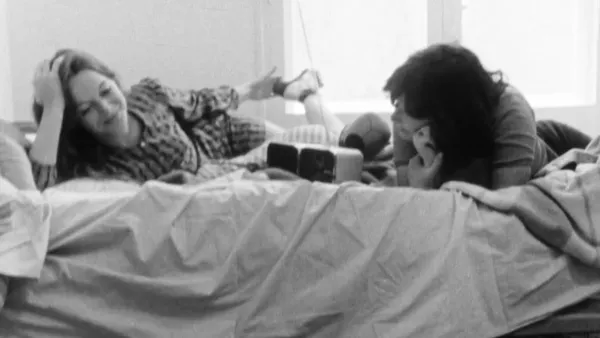Eye For Film >> Movies >> Chantal Akerman: Volume 1, 1967-1978 (2025) Blu-Ray Review
Chantal Akerman: Volume 1, 1967-1978
Reviewed by: Donald Munro
Read Donald Munro's film review of Chantal Akerman: Volume 1, 1967-1978
The Limited Edition BFI Blu-ray, Chantal Akerman: Volume 1, 1967-1978 is being released in conjunction with the 50th anniversary of Akerman's most famous and possibly most influential film, Jeanne Dielman, 23, Quai Du Commerce, 1080 Bruxelles. Spanning five disks, it covers the period between her earliest short films, four for her INSAS (Institut Supérieur des Arts) Entrance exam and Saute Ma Ville (which she made just after dropping out of film school), and the feature film Les Rendez-Vous D’Anna.
The first disk has the earliest films. The INSAS exams, despite the over enthusiastic teenage hard cutting, show the street photography sensibilities that can be seen in Akerman's later work. In Saute Ma Ville there is the kitchen which will feature so prominently in her later work. The rest of the disk is made up of experimental, unfinished or incomplete work. With experiments it is worth noting that they can fail, but the results are worth recording. They document development and inform what is produced afterwards. Most significant of these pieces is Hôtel Monterey where Akerman and Babette Mangolte take the street photography into the interior. They set up the camera in geometrically interesting places within the building and just let it film. The camera captures the interactions between people, architecture and observer.
Disk two has two films: Le 15/8 and Je Tu Il Elle. In Le 15/8, a Finnish expatriate in Paris, through talking about the mundane, expresses her feelings of dislocation. Her voiceover is set to a lone actress wandering around a flat while engaging in domestic activities. Je Tu Il Elle is Akerman's first full length film to feature a narrative. It is about sex as an escape route from a cycle of depression. It was important as part of both the feminist and queer cinematic discourse.
The centrepiece of the set is Jeanne Dielman, 23, Quai Du Commerce, 1080 Bruxelles. The restoration does justice to Akerman's cinematic vision.
The fourth disk contains the final two films in the set, the documentary News From Home and the drama Les Rendez-Vous D’Anna. In News From Home, Chantal Akerman reads from the letters her mother sent her while she was living in New York. It is set over footage that she has taken of the city. She voices the mundane, sometimes drowned out by the clatter of subway cars as we notice something strange and beautiful about the city she is filming: the faded candy colours of a food counter against grey concrete; the sleek insectoid curves of a Citroën DS in counterpoint to the American wheeled bricks; traffic demerging from a phalanx as the lights change, the cabs unfurling like yellow flower petals; a family standing up from a bench in mathematically perfect sequence. Or we don't. The New York City that Akerman filmed is long gone. All we have of it now is some low quality nostalgia: a muscle car crashing through boxes on a cop show and a couple of films. We can't tell her intention when we are so far removed from her subject.
Lastly there is a disk of special features. It has a number of archival pieces, an old interview with Akerman, and a couple that she conducted with cast and crew. There is footage taken during the filming of Jeanne Dielman, 23, Quai Du Commerce, 1080 Bruxelles and a video essay Leaving Home in which the artist Sarah Wood muses on News From Home and the current state of the United States. The piece that provides most insight into the filmmaker is her interview with her mother Natalia.
Reviewed on: 23 Feb 2025















